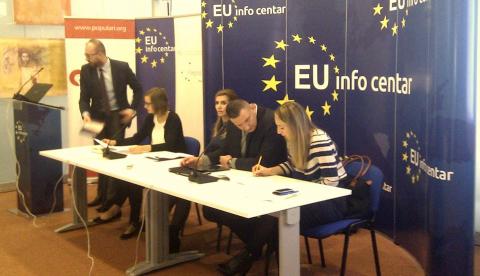Sarajevo and Budapest presentations of the "Civil Society in the EU Integration of the Western Balkans" report

Two presentations of the report “Civil Society in the EU Integration of the Western Balkans” in which CENS took part were held at the EU Info Center in Sarajevo on 13 November 2014 and in Budapest at the CEU on 27 November 2014. This report focuses on challenges in the cooperation between government and civil society in the Western Balkan countries in six selected areas covered by chapters 23 and 24 of the accession negotiations with the European Union. These include: effective monitoring of the implementation of action plans and strategies; human rights issues; migration and asylum policies; the judiciary and justice system; anti-corruption policies and activities; and, civic education.
Four of the 20 co-authors took part in both presentations of the report. In Sarajevo they indicated that cooperation between the BiH government and civil sector is very weak and fragmented. There is a great need for a continuous dialogue between the civil society organizations (CSOs) and the government, provided CSOs consolidate and improve communication among themselves. The presentations was delivered by Tomasz Żornaczuk, Editor of the publication and lead of the project “Thinking 4 Governance” (Polish Institute of International Affairs); Katarina Cvikl, Group editor and policy researcher (Think tank Populari); Mirela Hodović, Contributor and researcher (the Center for Security Studies); Dragan Vujanović, Contributor and deputy director (Programmes in Vaša Prava); and Hana Semanić, Moderator and research assistant (the Center for EU Enlargement Studies).
In Budapest, apart from Tomasz Żornaczuk and Hana Semanić, Qendresa Sulejmani from the Centre for Research and Policy Making (Macedonia) and Bojan Elek from the Belgrade Centre for Security Policy (Serbia) took part. The general conclusion was that, despite of some good examples in both countries, what lacks is trust when it comes to cooperation between governments and civil society organizations both in Macedonia and Serbia. Trust needs to be regained in order to perform joint actions on key reforms. CSOs need to be assured that the recommendations they present to the government are at least taken under consideration. To date, the governments actually discourage CSOs from cooperating since they are usually given chance only to see the final proposals whenever the laws are to be changed. This disables CSOs from participating in the consultation phase and hence from playing a role in facilitating the reforms. Even if the time is given for the NGOs to comment on the governmental proposals, it is usually too little to enable the government to react properly on the recommendations. This being said, the government lacks the consistency in cooperation and communication with the non-governmental actors.
In addition to the presentations in Sarajevo and Budapest, the report was also presented in Belgrade, Skopje, Pristina and Tirana. The final presentation will take place in Brussels on 19 November 2014.
For more information about the Sarajevo presentation (in local language), read the artcile by Radio Free Europe here.
